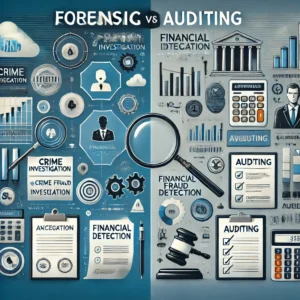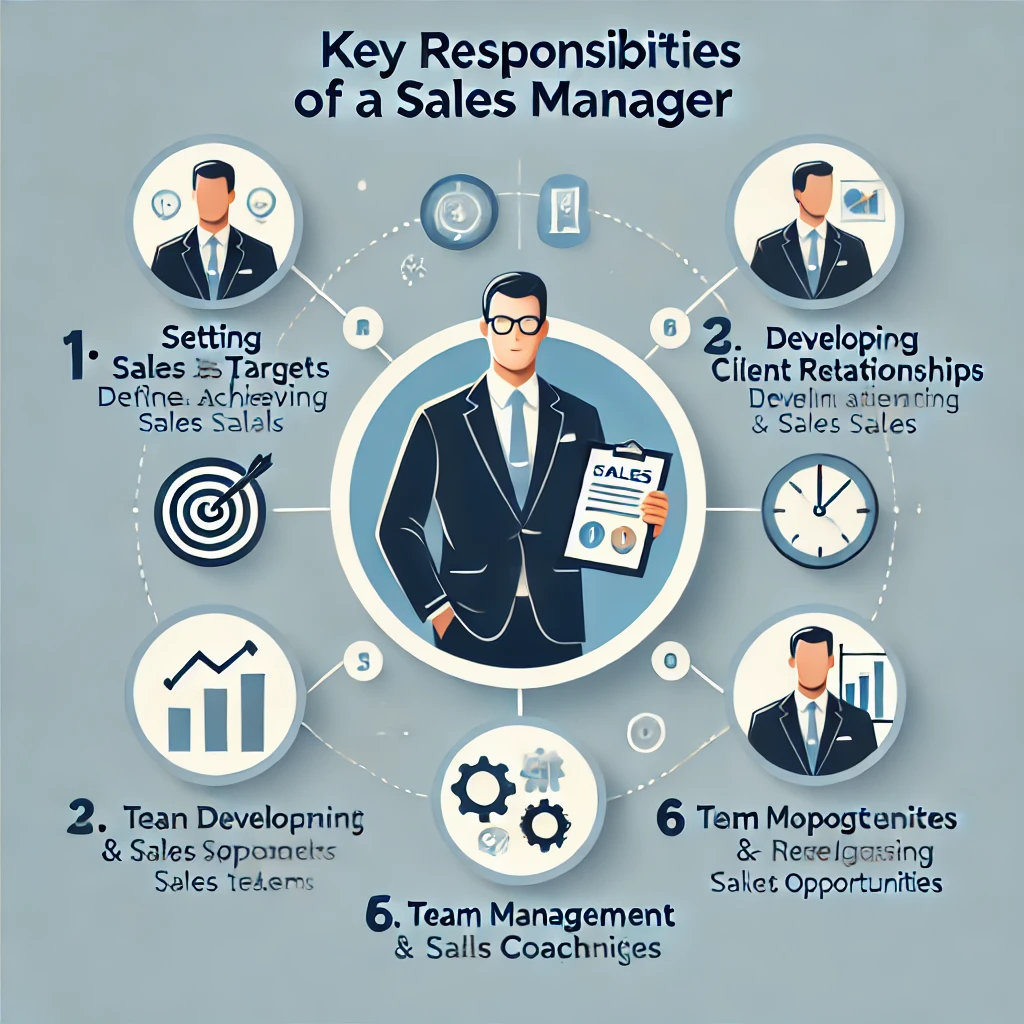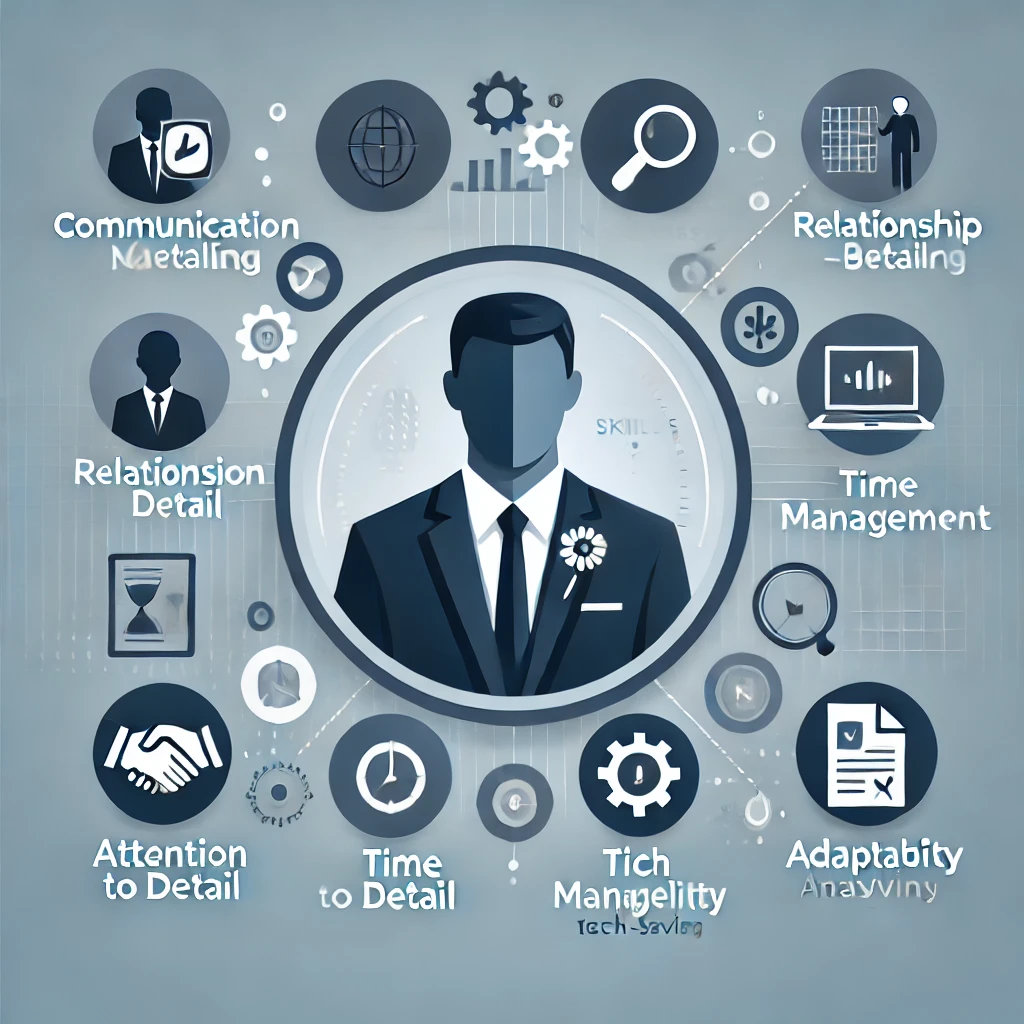Forensic Accounting- A forensic accountant is a financial investigator who examines financial records to uncover fraud, embezzlement, and other financial crimes. They combine accounting expertise with investigative skills to analyze complex financial transactions and provide evidence in legal cases. Forensic accountants often work with law enforcement agencies, corporations, or government bodies to detect financial misconduct and ensure compliance with financial regulations.
Differences Between Forensic Accounting and Auditing

Key Qualities of a Forensic Accountant.
Forensic accountant need technical knowledge, investigative skills, and strong ethics to succeed. Below are some of the most important qualities that define a successful forensic accountant:
1. Analytical Thinking.
Forensic accountants must analyze large amounts of financial data to find patterns, inconsistencies, or signs of fraud. They break down complex transactions into smaller parts to understand how money moves. This helps them identify illegal activities or financial mismanagement.
2. Attention to Detail.
A forensic accountant must carefully examine every document, transaction, and financial statement. Even a small mistake or unusual transaction can reveal a bigger issue, such as fraud or tax evasion. A sharp eye for detail helps uncover the truth behind financial records.
3. Problem-Solving Skills.
Financial fraud cases are often complicated. Criminals try to hide their tracks by using multiple accounts, fake transactions, or complex financial structures. A forensic accountant must think logically and use problem-solving skills to connect the dots and find out what happened.
4. Strong Ethics and Integrity.
Since forensic accountants work on legal cases, they must be honest and impartial. They should not be influenced by personal opinions or external pressure. Their job is to present the facts based on evidence, even if the findings are unfavorable for the company or client.
5. Communication Skills.
Forensic accountants often need to explain their findings to people who are not financial experts, such as lawyers, judges, or law enforcement officers. They must write clear reports and, in some cases, testify in court. Strong communication skills help them present their conclusions simply and understandably.
RELATED BLOG: Why You Need a Finance Writer in 2025
Key Responsibilities of a Forensic Accountant.
Forensic accountants handle a variety of tasks depending on their employer and the type of case they are working on. Below are their main responsibilities:
1. Investigating Financial Crimes.
Forensic accountants examine financial records to detect fraud, money laundering, or other illegal activities. They analyze bank statements, invoices, and tax returns to identify discrepancies and uncover hidden transactions that indicate financial misconduct.
2. Conducting Financial Audits.
They perform detailed audits to verify the accuracy of financial statements. This helps businesses and government agencies ensure their financial records are correct and free from fraud. Forensic accountants look for irregularities indicating theft, manipulation, or errors.
3. Gathering Evidence for Legal Cases.
Forensic accountants play a crucial role in legal investigations. They collect financial evidence, organize documents, and prepare reports that can be used in court. In some cases, they may be asked to testify as expert witnesses and explain their findings to judges and lawyers.
4. Preventing Fraud in Organizations.
Many businesses hire forensic accountants to prevent fraud before it happens. They assess a company’s financial controls and identify weaknesses that could lead to fraud or financial mismanagement. They also recommend policies to improve security and compliance.
5. Assisting in Insurance Claims and Disputes.
Forensic accountants help insurance companies investigate claims related to financial losses, such as fraud or business interruptions. They verify claims, assess damages, and determine the actual financial impact of an incident.
6. Tracing Hidden Assets.
Forensic accountants help track down hidden assets in cases like divorce settlements or bankruptcy proceedings. They investigate financial records to find undeclared income, offshore accounts, or fraudulent transactions.
RELATED BLOG: Best Ways to Find a Remote Gig
How to Become a Forensic Accountant.
Becoming a forensic accountant requires education, certification, and experience in both accounting and investigative techniques. Follow these steps to build a successful career in forensic accounting.
1. Earn a Bachelor’s Degree in Accounting or a Related Field.
The first step to becoming a forensic accountant is earning a bachelor’s degree in accounting, finance, economics, or a related field. Some universities offer specialized courses in forensic accounting, fraud examination, and financial investigation. A strong foundation in accounting principles, auditing, and financial reporting is essential for this career.
2. Gain Relevant Work Experience.
Many forensic accountants start their careers as general accountants or auditors. Working in accounting, auditing, or finance helps you develop the skills needed to analyze financial statements and detect irregularities. Some common entry-level positions include:
- Staff Accountant.
- Internal Auditor.
- Financial Analyst.
- Tax Examiner.
3. Obtain Professional Certifications.
Certifications increase job opportunities and credibility. Some of the most recognized certifications for forensic accountants include:
- Certified Public Accountant (CPA): Required for many accounting positions and helps build a strong accounting foundation.
- Certified Fraud Examiner (CFE): This certification, offered by the Association of Certified Fraud Examiners (ACFE), focuses on fraud detection and investigation.
- Certified Forensic Accountant (Cr.FA): A certification specifically for forensic accountants offered by the American Board of Forensic Accounting (ABFA).
- Certified in Financial Forensics (CFF): This certification, issued by the American Institute of Certified Public Accountants (AICPA), is ideal for CPAs who specialize in forensic accounting.
4. Develop Investigative and Analytical Skills.
Forensic accountants must think like investigators. Developing skills in data analysis, auditing, and fraud detection is crucial. Many professionals take specialized courses in forensic accounting, criminal justice, or cybersecurity to strengthen their expertise.
5. Gain Experience in Forensic Accounting.
Once you have the necessary education and certifications, you need hands-on experience in forensic accounting. You can work in:
- Law enforcement agencies (FBI, IRS, or police departments).
- Accounting firms with forensic accounting divisions.
- Government agencies (SEC, Treasury Department, or state tax authorities).
- Private corporations (fraud prevention and risk management teams).
- Insurance companies (fraud investigation units).
6. Stay Updated and Continue Learning.
Financial crimes occur constantly, and forensic accountants must stay current with new fraud techniques and investigative tools. Joining professional organizations like the Association of Certified Fraud Examiners (ACFE) and attending industry conferences can help them stay ahead in their field.
Differences Between Forensic Accounting and Auditing.
Forensic accounting and auditing both involve examining financial records, but they serve different purposes and require different skill sets. While auditors focus on ensuring that financial statements are accurate and comply with regulations, forensic accountants investigate financial fraud and provide evidence for legal cases.
1. Purpose and Objective.
Forensic Accounting – This focuses on detecting fraud, embezzlement, and financial crimes. Forensic accountants investigate suspicious financial activities and provide evidence in court cases.
Auditing – This ensures that a company’s financial records are accurate and comply with accounting standards. Auditors verify financial statements and assess internal controls but do not focus on fraud investigation unless irregularities are found.
2. Scope of Work.
Forensic Accounting – This involves detailed financial investigations, asset tracing, fraud detection, and litigation support. The work often includes gathering evidence for legal proceedings.
Auditing – This focuses on reviewing financial records to confirm accuracy and detect errors or misstatements. Auditors may recommend process improvements to prevent fraud but do not actively investigate crimes.
3. Methods and Techniques Used.
Forensic Accounting – Uses investigative techniques like data analysis, digital forensics, financial modeling, and fraud examination. Forensic accountants track hidden transactions and uncover fraudulent activities.
Auditing – Uses sampling methods, risk assessments, and internal control evaluations to ensure financial accuracy. Auditors focus on compliance with Generally Accepted Accounting Principles (GAAP) or International Financial Reporting Standards (IFRS).
4. Reporting and Documentation.
Forensic Accounting – Produces detailed investigative reports that may be used as evidence in court. Reports include findings on fraud, asset tracing, and financial discrepancies.
Auditing – Produces audit reports that summarize financial accuracy and compliance with accounting standards. The report may include recommendations for internal controls and financial reporting improvements.
5. Legal Involvement.
Forensic Accounting – Directly involved in legal cases, working with law enforcement, attorneys, and regulatory agencies. Forensic accountants may testify as expert witnesses in court.
Auditing – Typically not involved in legal cases unless fraud or financial misconduct is discovered. If an auditor finds fraud, they may refer the case to forensic accountants or legal authorities.
Job Outlook and Demand for Forensic Accountants.
Forensic accounting is a fast-growing profession in demand in both the public and private sectors. As financial fraud and cybercrime increase, companies and government agencies need forensic accountants to investigate crimes, prevent fraud, and ensure compliance with financial regulations.
1. Growing Demand for Forensic Accountants.
The need for forensic accountants is rising because businesses and governments want to reduce fraud and financial crime. According to the U.S. Bureau of Labor Statistics (BLS), jobs for accountants and auditors (including forensic accountants) are expected to grow by 6% from 2022 to 2032. This means thousands of new forensic accounting jobs will be available in the coming years. Several factors contribute to this growth:
- Increase in financial fraud cases. Many companies lose money due to fraud, theft, and embezzlement. Forensic accountants help detect and prevent these crimes.
- Stronger government regulations – Governments now require businesses to follow stricter financial laws. Forensic accountants ensure companies comply with these laws.
- Rising cybercrime – Many financial crimes happen online, such as identity theft, hacking, and money laundering through digital platforms. Forensic accountants with cybersecurity skills are in high demand.
2. Industries That Hire Forensic Accountants.
Forensic accountants can work in many different industries. Some of the top employers include:
- Law Enforcement Agencies – The FBI, IRS, SEC (Securities and Exchange Commission), and local police departments hire forensic accountants to investigate fraud and financial crimes.
- Government Agencies – Organizations like the U.S. Treasury Department, the Department of Justice, and state tax authorities employ forensic accountants to prevent tax fraud, money laundering, and corruption.
- Accounting and Audit Firms – Many forensic accountants work for Big Four accounting firms (Deloitte, PwC, EY, KPMG) or forensic audit teams that help businesses uncover fraud.
- Corporations and Financial Institutions – Large companies and banks hire forensic accountants to monitor financial transactions, detect fraud, and ensure compliance with financial laws.
- Insurance Companies – Forensic accountants in the insurance industry investigate fraudulent claims, determine financial losses, and prevent false insurance payouts.
3. Future Opportunities in Forensic Accounting.
The demand for forensic accountants will continue to grow as financial crimes become more complex. Professionals who specialize in cybersecurity, digital forensics, and fraud detection software will have even more job opportunities.
Conclusion.
With financial fraud and cybercrime on the rise, the demand for skilled forensic accountants will continue to grow. Whether working for a government agency, law enforcement, or a private company, forensic accountants play a vital role in protecting businesses and ensuring financial integrity. If you are passionate about accounting, investigation, and problem-solving, forensic accounting could be the perfect career for you!












